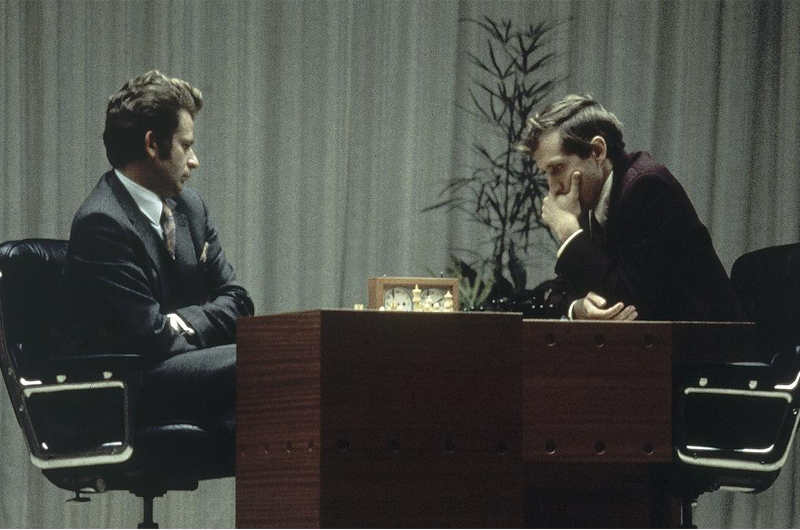Russian Boris Spassky lost the Match of the Century as it was hailed at the time, the world title, to American Bobby Fischer. The title clash played at the unusual venue of Reykjavik in Iceland in July-August 1972 aroused unprecedented interest around the world. Played during the height of the Cold War, there was an unmistakable American vs Russian narrative woven into the contest and this sparked excitement the world over and a never before seen increase in media coverage for any chess match, says Partab Ramchand, and goes on to describe the time leading to the title clash and the days thereafter. Spassky passed away in February this year
If fate had decreed otherwise, Boris Spassky would have been remembered first and foremost as the tenth world chess champion and a player whose polite, friendly disposition and entertaining games made him one of the most popular champions in the sport of 64 squares. Instead, the amiable Russian is remembered as the world champion who lost the Match of the Century as it was hailed at the time, the world title, to the eccentric American Bobby Fischer. The title clash played at the unusual venue of Reykjavik in Iceland in July-August 1972 aroused unprecedented interest around the world. Even those who would not know the difference between a knight and a bishop followed the encounter with undisguised eagerness. Played during the height of the Cold War, there was an unmistakable American vs Russian narrative woven into the contest and this sparked excitement the world over and a never before seen increase in media coverage for any chess match
Spassky, who passed away in February this year at the age of 88, was a likeable personality. Even though he went down to Fischer by 12 ½ points to 8 ½, he was not really blamed for the loss even if it meant the end of a 24-year-old long domination by Russian world champions. He did face political pressure to win the match but such was his pleasing personality that the authorities in the then USSR did not come down on him like a ton of bricks. He had been a well-known chess player for long, becoming a GM (Grandmaster) at the age of 18 and was always looked upon as a future world champion. He first qualified for the world championship in 1966 when he lost to Tigran Petrosian. Three years later, he earned the right to challenge his fellow Soviet again and this time defeated Petrosian to win the title. Chess experts highlighted his “universal style which involved an ability to play the most varied types of positions”. He clearly had a leaning toward sharp, attacking play and possessed a splendid feel for taking the initiative.
By 1972, however, Fischer was in dominant form. In the Candidates matches en route to becoming the challenger, he had beaten two GMs, Mark Taimanov and Bent Larsen, by perfect scores of 6-0, a feat not previously achieved in a Candidates match. In the Candidates final against Petrosian, Fischer won the first game, lost the second, drew the next three and then finished with four consecutive victories to win the match 6 ½ to 2 ½. The magnitude and impact of the results was unprecedented in the world of chess. From the last seven rounds of the inter-zonal until the first game against Petrosian, Fischer won 19 games (plus one on forfeit) without losing once, almost all against top GMs.
Coming into the world championship match, Fischer had a much higher Elo (method for calculating the relative skill levels of players) LO rating than Spassky. In the July 1972 FIDE rating list, he was on 2785, a record 125 points ahead of Spassky the No. 2 player, whose rating was 2660. Fischer’s recent results made him the pre-match favourite. Some observers, however, noted that Fischer had never won a game against Spassy. Before the match, Fischer had played five games against Spassky drawing two and losing three.
The eagerly awaited encounter was marked by several controversies, all of them involving Fischer. He was known for his eccentricities but he clearly went overboard regarding issues like prize money, arrangements at the hall where the games would be played and even the chess sets to be used. Spassy sportingly agreed to his demands despite Fischer’s “outrageous conduct” as described by the Soviets. Some commentators, however, contended that Fischer was playing a game of psychological warfare with Spassky and his demands and his protests were all calculated to unnerve the supposedly unflappable Russian.
When the clash finally got underway, Fischer initially trailed 1 ½ to 2 ½, including a forfeit, but then recovered and clinched the championship when Spassy resigned after game 21, making him the first American to win the world title. Spassky was just 35 when he lost to Fischer and he continued to figure in the Candidates matches. In the next cycle in 1975, he defeated American Robert Byrne but then lost the semifinal match to Anatoly Karpov, who went on to become world champion when Fischer defaulted. In later years, Spassky showed a reluctance to devote himself completely to chess. In 1976, he migrated to France, became a French citizen in 1978, and competed for his adopted country in the Chess Olympiads.
Spassky, however, notched up some notable victories whenever he played and most interestingly played Fischer again in 1992. The American after a 20-year hiatus from chess emerged to arrange a “revenge match of the 20th Century” against Spassky. At the time, Spassky was rated 106th in the FIDE ratings and Fischer did not appear on the list at all owing to his inactivity. Spassky lost the match but earned 1.65 million dollars for the same.
(The writer is a veteran sports writer who spent his career working for The Indian Express and The Telegraph and Sportsworld. He lives in Chennai.)



 from Webdoux
from Webdoux